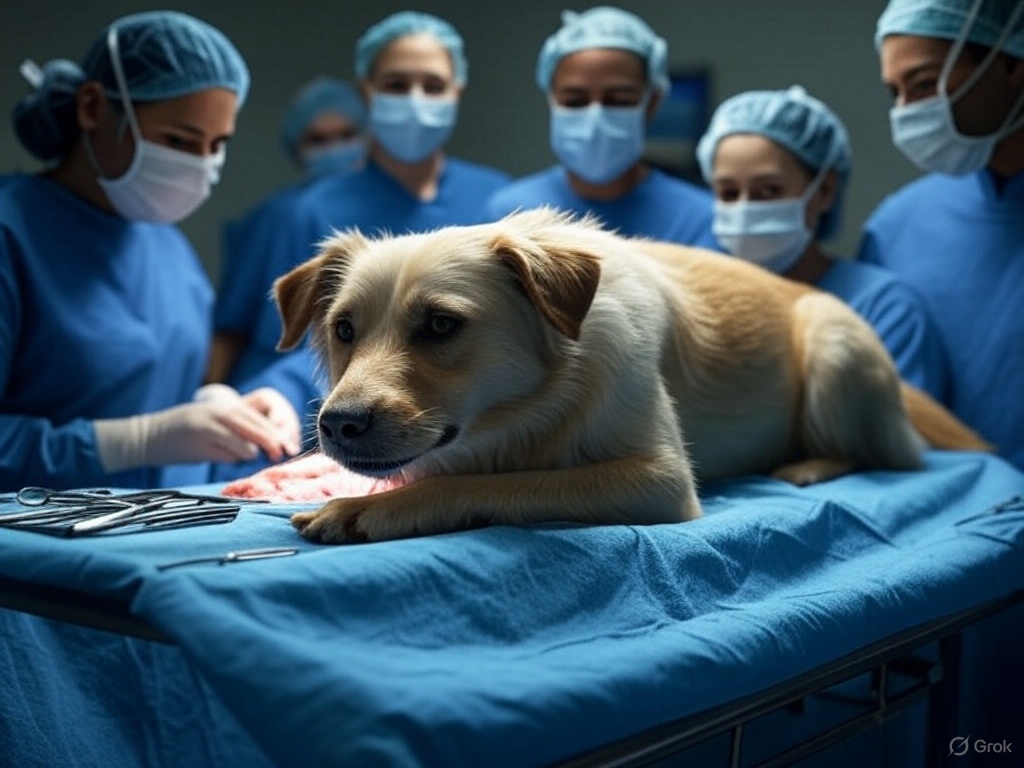
Guide to Post-Splenectomy Diet for Dogs
After a splenectomy, a dog’s diet should support recovery, immune function, and overall health, as the spleen plays a role in immunity and blood filtration. Always consult your veterinarian for a tailored plan, as individual needs vary based on the dog’s condition, age, and underlying health issues. Below is a general guide:
Recommended Diet
- High-Quality, Easily Digestible Protein:
- Include: Lean meats like chicken, turkey, or fish; eggs; or high-quality commercial dog foods with named protein sources (e.g., “chicken” rather than “poultry by-products”).
- Why: Supports tissue repair and immune function without overloading the digestive system.
- Note: Ensure protein is moderate (not excessively high) to avoid stress on the liver or kidneys, especially if the dog has other health issues.
- Low-Fat Foods:
- Include: Low-fat cuts of meat, low-fat cottage cheese, or commercial diets labeled for sensitive digestion or low-fat needs.
- Avoid: High-fat foods like fatty meats, excessive oils, or rich treats (e.g., bacon, peanut butter in large amounts).
- Why: The spleen helps regulate blood lipids, and high-fat diets may strain the liver or cause digestive upset post-surgery.
- Complex Carbohydrates:
- Include: Brown rice, oatmeal, sweet potatoes, or pumpkin (in moderation).
- Why: Provides energy and fiber to support digestion and stabilize blood sugar.
- Fiber-Rich Foods:
- Include: Vegetables like green beans, carrots, or small amounts of pureed pumpkin.
- Why: Promotes gut health and prevents constipation, which can be an issue post-surgery.
- Antioxidant-Rich Foods:
- Include: Blueberries, spinach, or small amounts of broccoli (if tolerated).
- Why: Supports immune health, as the spleen’s removal may increase infection risk.
- Small, Frequent Meals:
- Feed 3-4 small meals daily instead of one or two large ones to reduce digestive strain and maintain energy levels.
Foods to Avoid
- High-Fat or Greasy Foods:
- Avoid fried foods, fatty table scraps, or high-fat treats, as they can cause pancreatitis or digestive issues.
- Processed or Low-Quality Foods:
- Skip foods with artificial additives, fillers, or vague ingredients (e.g., “animal by-products”).
- Raw Diets (Unless Vet-Approved):
- Raw diets may pose infection risks due to reduced immune function post-splenectomy, unless carefully managed under veterinary guidance.
- Toxic Foods:
- Avoid grapes, raisins, onions, garlic, chocolate, and xylitol-containing products, as these are toxic to dogs and may complicate recovery.
Additional Considerations
- Hydration: Ensure constant access to fresh water to support digestion and overall health.
- Supplements (Vet-Approved):
- Omega-3 fatty acids (fish oil) for anti-inflammatory benefits.
- Probiotics to support gut health.
- Avoid giving supplements without veterinary approval, as some may interfere with recovery.
- Commercial vs. Homemade:
- Commercial Diets: Look for AAFCO-approved foods labeled for “complete and balanced” nutrition, ideally for sensitive stomachs or post-surgical recovery.
- Homemade Diets: Only use under veterinary guidance with a recipe formulated by a veterinary nutritionist to ensure nutritional balance.
- Monitor for Infections: Since the spleen aids immunity, watch for signs of illness (lethargy, fever, loss of appetite) and maintain regular vet checkups.
Sample Daily Diet (Example for a Medium-Sized Dog)
- Breakfast: 1/2 cup cooked chicken breast, 1/4 cup cooked brown rice, 1 tbsp steamed carrots.
- Lunch: 1/4 cup low-fat cottage cheese, 1/4 cup cooked sweet potato.
- Dinner: 1/2 cup high-quality low-fat kibble (vet-recommended), 1 tbsp pureed pumpkin.
- Treats: Small pieces of boiled chicken or a few blueberries (sparingly).
Final Notes
- Transition Gradually: Switch to a new diet over 7-10 days to avoid digestive upset.
- Regular Monitoring: Track weight, appetite, and stool quality, and report changes to your vet.
- Underlying Cause: If the splenectomy was due to cancer (e.g., hemangiosarcoma) or other conditions, the diet may need further adjustments based on prognosis or treatments like chemotherapy.
For a specific plan, ask your vet to recommend a commercial food or refer you to a veterinary nutritionist.
Please login to post a comment.


